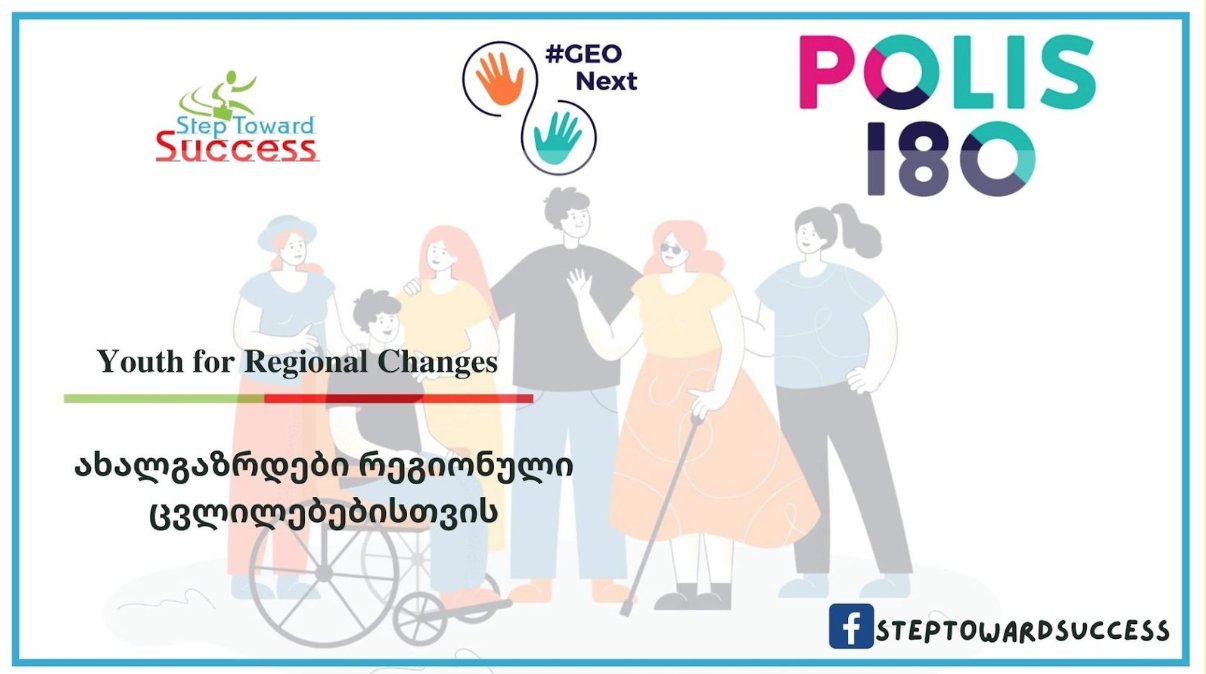An analysis by Nora Pohl
with Rima Beridze, Linda Beridze, Ana Sikhashvili, Dima Karchava, Nino Odisharia, Anna Sakhokia, Giorgi Kemularia, Mariam Jghamadze and Mariam Bolkvadze
In Georgia, people with disabilities face multiple challenges when it comes to participating in public and social life. Two groups of young people from different Georgian regions prove that through innovative ideas and cooperation with experienced experts, these challenges can be tackled.
Social inclusion is defined by the World Bank as “the process of improving the terms on which individuals and groups take part in society—improving the ability, opportunity, and dignity of those disadvantaged on the basis of their identity.” While a recent study commissioned by the Council of Europe detects a decline of negative perceptions towards minorities in Georgia, the level of exclusion of certain social groups is still high. Even though the attitudes towards ethnic and religious minorities improved during the last years, the majority of Georgians is not aware of the challenges which people with disabilities face in their daily life. But if the majority of society does not even know or acknowledge that certain societal groups are excluded, how can the living conditions and the social participation of members of these groups be improved?
Cross sector cooperation and the potential of grassroots activism
Complex societal issues are unlikely to be solved if only one sector is involved – instead, a combination of different perspectives, approaches and resources increases the chances for real change. Therefore, cross-sector cooperation is on the rise. By including different actors from the non-profit, the governmental, as well as the business sector, “differences in resources, experience, demographics, industry, and sector, as well as differences in perspective, such as assessments of risk, time, and scale” are used as an asset according to the Stanford Social Innovation Review. Beyond public-private partnerships (PPPs), this concept can also be extended to national or international non-governmental organisations and local grassroots initiatives that focus on specific issues in their communities. In this case, professional experience from the private or public sector is combined with the first-hand knowledge of individuals who are deeply rooted and involved in the given local context.
Tackling the discrimination against people with disabilities in Georgia
According to the World Report on Disability, discrimination against people with disabilities leads to a lesser degree of economic activity and higher rates of poverty as well as serious barriers to participating in all levels of daily live, from using public services to participating in social and cultural events and beyond. These global trends are in line with the findings of a 2021 situation analysis of the rights of people with disabilities in Georgia.
In the course of #GEONext, two groups of young people developed local grassroots initiatives to tackle some of these issues in their respective regions. In their project “Public spaces’ accessibility for people with disabilities,” participants focused on the issue of accessibility in public spaces. The second group, “Youth for regional changes,” highlights the importance of professional development and improvement of soft skills in order to increase the chances for people with disabilities in the job market. To achieve their goals, both groups were supported by experienced actors from the field who offered their perspectives and professional insights. Caritas Georgia has been working with marginalized and vulnerable groups since 1994, mainly focusing on their self-reliability and dignity. Women Engage for a Common Future (WECF) Georgia contributes to the participation and inclusion of women and marginalized groups by amplifying their voices, especially in local politics.
Both groups highly valued the advice they received by their mentors during the at times challenging implementation of their initiatives: “We, as a small initiative group, faced many challenges during the project planning and implementation stage, such as limited experience, team building, community mobilization, and time management. However, the mentors shared their knowledge and experience from their large organizations. Thus, cooperation and experience sharing was a very interesting and pleasant process for us,” says Dima Karchava from Senaki’s youth initiative group – „Aba Ula“. According to Rima Beridze from “Youth for regional changes”, the cooperation with established international NGOs did not only provide his group with knowledge and advice, but also with these NGOs’ networks of activists.
By combining the local grassroots perspective of young people with and without disabilities with the guidance and professional backgrounds of international organisations from the same field, our groups were able to develop and implement their projects in an effective and comprehensive manner, while their international partners benefited from their innovative ideas and approaches, as well as knowledge of the local needs.
Learn more about our project #GEONext here!
#GEONext is funded by the Federal Foreign Office in the framework of the programme “Expanding Cooperation with Civil Society in the Eastern Partnership Countries and Russia” and kindly supported by the German Embassy Tbilisi.
#civilsocietycooperation
The Polis Blog serves as a platform at the disposal of Polis180’s & OpenTTN’s members. Published comments express solely the authors’ opinions and shall not be confounded with the opinions of the editors or of Polis180.
Image by #GEONext
Nora had been an active member of Polis180 for more than two years and is currently one of the heads of the Polis180 program Perspektive Ost which targets Germany’s Eastern Neighborhood from Poland to Central Asia and is also where our German-Georgian cooperation is anchored. After graduating in Eastern European Studies, Nora worked as a coordinator in various projects aiming to connect young people from Eastern and Western Europe. Through those projects, she aims to reduce stereotypes, improve cooperation and support the participation of marginalized groups in society. Currently her focus is on helping people who fled the war in Ukraine and she has recently taken over the management of a Berlin-based refugee center. Her culinary interests include Georgian badrijani nigvzit and pancakes. Nora is the #GEONext co-mentor in the field of Inclusion.
